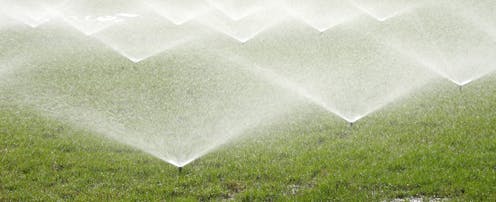Source: The Conversation (Au and NZ) – By Julia Talbot-Jones, Senior lecturer, Te Herenga Waka — Victoria University of Wellington

Shutterstock/Dr Ajay Kumar Singh
As New Zealand’s new Prime Minister Chris Hipkins embarks on reprioritising policies to focus on “bread and butter issues”, the details of the contentious Three Waters reforms remain unclear.
The reforms represent a radical reshaping of water, wastewater and stormwater management, with the aim of building a new integrated system across New Zealand. The legislation passed in December last year, but the PM has promised a “reset”.
Whatever the final details, a study conducted by Motu Economic and Public Policy Research highlights the need for improved environmental reporting to help deliver urban water supply security.
Our research aims to answer the question of whether water metering and pricing have any impact on water consumption in Aotearoa New Zealand. This should be a straightforward question to answer. But our data collection process has exposed gaps that obscure public accountability and limit the potential for evidence-based policy.
No central database to collate data
Data on urban freshwater use is not easily accessible in Aotearoa New Zealand. There is no central database or governing authority that collates information about demand and supply.
Instead, freshwater is managed by local authorities which have a range of processes and frameworks for collecting information on water consumption within their jurisdiction.
Data can be obtained (by researchers or the public) through requests under the Local Government Official Information and Meetings Act (LGOIMA). This process involves asking councils for information they may have on file, but that isn’t accessible to the public.
Councils have 20 working days to respond and can either provide the information, request an amendment or extension, or refuse the request if it is perceived as beyond their capacity. Councils can also demand a fee be paid to collate the information if it is poorly organised and difficult to gather.
Disappointing dearth of water information
Our data collection process involved issuing LGOIMA requests to 67 local and district councils across the country. The information requested included monthly consumption and production data that could then be adjusted for seasonal variation, particularly droughts or floods.
We asked councils to provide records that went as far back as possible. We also asked for any records of leaks and institutional information such as whether meters were used or what pricing models (flat pricing or volumetric pricing) were in place and when these mechanisms were introduced.
The information we received was disappointing and points to a lack of public accountability.
Of the 67 local and district councils approached, 88% were unable to provide us with data that met our request. Most provided information that was spotty, inconsistent, aggregated and only went back two years.
Seven councils refused to fill our request, citing limited capacity. Nine said they could provide the information at a fee, with some charging several thousands of dollars.
There were only eight councils which did provide us with full records, some tracing back to the 1980s. This shows comprehensive data collection by local authorities is possible, whether meters are in place or not. But if high-quality data is largely absent, this raises questions about how we can design policy to ensure it delivers benefits for communities and the environment.
How to close the data gap
Evidence-based or evidence-informed policy is the gold standard of policy making. If decision makers are unable to access data, it reduces their capacity to make policy recommendations likely to deliver welfare improvements for the communities they serve.
Despite its clean and green image, Aotearoa New Zealand has a poor history of environmental reporting, monitoring and enforcement. If decision makers don’t have an up-to-date understanding of what is happening in the environment, any management systems they design are unlikely to be very successful.
With the ongoing reform of drinking water, wastewater and stormwater services, we need to think critically about ways to improve institutional design to help address some of the data gaps that pervade Aotearoa New Zealand’s freshwater records.
We suggest local authorities should be provided with a data-collection template that is comparable across regions and over time. If the management of drinking water, wastewater and stormwater is centralised as part of the Three Waters reforms, developing consistent approaches to data gathering, storage and dissemination across the four proposed government entities should be a priority.
Data – facts, records or measures – are fundamental to initiating any research, validating models, estimating trends and monitoring changes over time. There should be no mismanagement or financial barriers to consistent collection and access.
As pressures on freshwater resources increase, access to basic data is critical to ensure Aotearoa New Zealand can deliver urban water security for all.
![]()
Julia Talbot-Jones is an Affiliate of Motu Economic and Public Policy Research. The research referred to in this article is funded by the Aotearoa Foundation.
Thomas Benison is a Research Analyst at Motu Economic and Public Policy Research. The research referred to in this article is funded by the Aotearoa Foundation.
– ref. It’s near impossible to get good data on water use in New Zealand. This raises questions about public accountability – https://theconversation.com/its-near-impossible-to-get-good-data-on-water-use-in-new-zealand-this-raises-questions-about-public-accountability-198983



